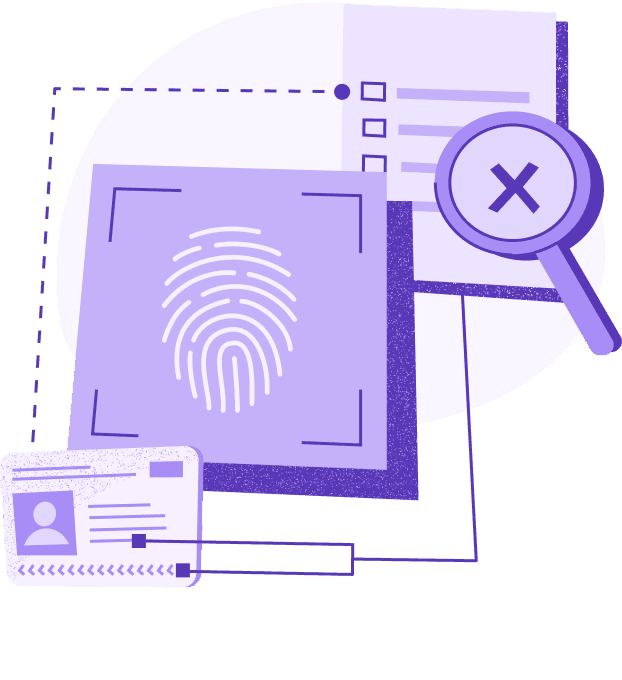Article
7 min read
A Guide to Employee Background Checks in Colombia
Employee background checks
Legal & compliance

Author
Michał Kowalewski
Last Update
September 05, 2025

Table of Contents
What employers need to know before running background checks in Colombia
Are background checks legal in Colombia?
What types of background checks are illegal in Colombia?
Industries where background checks are common in Colombia
Types of employee background checks in Colombia
Background check mistakes to avoid in Colombia
Step-by-step guide to employee background checks in Colombia
Key takeaways
- Global employers looking to hire in Colombia need to adhere to Colombia's Habeas Data Law and obtain explicit written consent from candidates before initiating background checks to ensure privacy and avoid legal issues
- Common background checks in Colombia include verifying employment history, educational background, and criminal records. However, credit checks are less common and require explicit consent due to legal restrictions
- Employers should avoid conducting checks without consent, using sensitive personal information for hiring decisions, ignoring cultural norms, relying on unverified sources, and engaging in discriminatory practices
Employee background checks should be an integral part of your hiring process in Colombia. Although not mandatory, they are a common practice, especially in finance, healthcare, education, security services, government and the public sector.
International employers see Colombia as an attractive location for hiring, because of its economic growth, educational advancements, and skilled workforce, particularly in IT, marketing, and design sectors.
However, running employee background checks in Colombia requires an understanding of both local labor laws and cultural nuances. Employers must also strategically time these checks before job offers are made to comply with Colombian regulations and ensure a fair and transparent selection process.
In this article, you will discover:
- How to run an effective and legal employment screening in Colombia
- What the common types of employee checks are in Colombia
- How to carry out a thorough employee screening, step by step
- What mistakes to avoid when performing a background check in Colombia
What employers need to know before running background checks in Colombia
An employee background check is the process of verifying a potential hire’s work history, education, professional qualifications, and any criminal records they might have. It’s particularly beneficial to run before finalizing an employment offer or signing a contract, ensuring the candidate meets the company's standards and requirements.
In Colombia, employee background checks are governed by the Protection of Personal Data Law (Habeas Data Law), and enforced by the National Data Protection Authority (Superintendencia de Industria y Comercio).
-
Habeas Data Law (Ley 1273 of 2009): Safeguards individuals' personal information. This law regulates how data is collected, used, and disseminated, including information gathered during background checks
-
National Data Protection Authority (Superintendencia de Industria y Comercio - SIC): The primary body overseeing the enforcement of these data protection laws. The SIC provides comprehensive guidelines to assist organizations in implementing the Data Protection Law effectively, focusing on aspects such as risk management, children's data protection, and data security incident management
Additionally, cultural considerations play a significant role in background checks in Colombia. Trust and personal relationships are highly valued in the Colombian business culture. Therefore, conducting thorough background checks demonstrates a commitment to building trust and maintaining a safe work environment, which aligns with the cultural expectations of professionalism and integrity in business relationships.
Are background checks legal in Colombia?
Background checks are legal in Colombia, provided that they comply with the Habeas Data Law and other relevant privacy regulations.
Employers must obtain explicit, written consent from job applicants before initiating any background checks. Failure to obtain consent or conducting unauthorized background checks can result in severe penalties, including fines and legal repercussions.
Background checks
What types of background checks are illegal in Colombia?
While background checks are generally permissible in Colombia, certain types of checks are restricted or considered illegal.
- Employers should refrain from requesting or using information that is not directly related to the job requirements when conducting background checks. It is essential to focus on relevant aspects such as employment history, qualifications, and criminal records, while respecting the privacy and dignity of the job applicants
- Using sensitive personal information, such as religious beliefs or sexual orientation, as a basis for hiring decisions is strictly prohibited under the Habeas Data Law
- Conducting credit checks without explicit consent from the job applicant is prohibited
Industries where background checks are common in Colombia
In Colombia, background checks are a common practice in numerous sectors to uphold safety, security, and professionalism. These checks play a crucial role in verifying the credibility and reliability of individuals, especially in roles that involve sensitive information or vulnerable populations. Key industries where background checks are routinely conducted include:
- Finance: Employees dealing with sensitive financial transactions are thoroughly vetted to safeguard against fraud and maintain trust
- Healthcare: To protect patients and ensure quality care, healthcare workers undergo background checks to verify their qualifications and integrity
- Education: Educators and staff are screened to create a safe learning environment for students and uphold educational standards
- Security: Background checks in the security sector are vital to ensure that personnel are trustworthy and capable of protecting assets and individuals
Types of employee background checks in Colombia
Effective employment background checks in Colombia cover essential aspects to evaluate a candidate's abilities. Knowing these areas helps employers tailor screening processes to meet job requirements and legal standards.
| Type of Check | Common in Colombia? | Reason |
|---|---|---|
| Criminal Record Check | Common | This is a common and essential check to ensure the safety and security of the workplace |
| Employment Verification | Common | Verifying the applicant's employment history and performance is a standard practice in Colombia |
| Educational Background Verification | Common | Confirming the educational qualifications the applicant claims to hold is a common practice to assess their credibility |
| Credit History Check | Less common | Due to legal restrictions, credit history checks are less common in Colombia and require explicit consent from the applicant |
| Social Media Screening | Less common | While it is becoming more prevalent, social media screening is still relatively less common compared to other background checks |
Background check mistakes to avoid in Colombia
Whether you’re hiring employees or independent contractors in Colombia, there are a few things you should avoid doing as an employer when it comes to background checks:
- Failing to obtain consent: Conducting background checks without explicit consent from the job applicant can lead to legal consequences and damage the employer's reputation
- Violating privacy laws: Using sensitive personal information for hiring decisions or failing to comply with data protection laws can result in severe penalties
- Neglecting cultural considerations: Ignoring the cultural emphasis on trust and personal relationships can affect the employer's credibility and reputation in Colombia
- Relying on unverified sources: Failing to verify the authenticity of information obtained during background checks can lead to inaccurate assessments and hiring decisions
- Discriminatory practices: Using background checks to discriminate based on protected characteristics, such as race, gender, or religion, is illegal and viewed as unethical in Colombia
Compliance
Step-by-step guide to employee background checks in Colombia
When hiring in Colombia, employers should follow the steps below to conduct legal and effective employee background screening:
- Obtain consent: Before initiating any background checks, obtain explicit consent from the job applicant in accordance with the Habeas Data Law. Inform the applicant about the purpose and scope of the background check
- Verify identity: Verify the identity of the job applicant by requesting official identification documents, such as a national ID card or passport
- Check employment history: Verify the applicant's employment history, including previous positions, job responsibilities, and reasons for leaving previous roles
- Verify educational background: Confirm the educational qualifications claimed by the applicant, including degrees, certifications, and academic achievements
- Check criminal records: Conduct a criminal records check through the National Police database to ensure the applicant does not have a history of criminal offenses that would make them ineligible for the role
- Check references: Contact the applicant's provided referees to gain insights into their work ethic, professionalism, and interpersonal skills
- Check financial history: While credit checks require explicit consent, employers can verify financial stability through employment verification and reference checks
- Conduct social media screening: Review the applicant's publicly available social media profiles to assess their online presence and professional conduct
- Inform the candidate: Share a summary of the background check results with the candidate and give them the opportunity to explain any discrepancies or mistakes it may reveal
- Document the process: Document the background check process thoroughly, including consent forms, verification results, and any relevant communications
You can also automate this process using Deel, and receive the results of a fast employee background check within minutes.
Many of our processes and compliance certifications require that we conduct background checks on all full-time consultants and employees of the company. Deel makes this easy as the background check is a seamless add-on during the onboarding process. It's quick, there's no duplication of information, and the report is saved within the team member's profile for easy reference in the future.
—Audrey McNicholas,
Head of Business Operations, Condor
Run employee background checks with Deel
There’s no need for HR to log into yet another platform or manually chase documents. With screenings in over 200 countries and territories (and counting), for employees and contractors, you can manage background checks for global hires with a single source of truth without leaving the Deel platform.
Are you looking for an easy and safe way to run a background check? Get results within minutes with Deel.

Michał Kowalewski a writer and content manager with 7+ years of experience in digital marketing. He spent most of his professional career working in startups and tech industry. He's a big proponent of remote work considering it not just a professional preference but a lifestyle that enhances productivity and fosters a flexible work environment. He enjoys tackling topics of venture capital, equity, and startup finance.
















